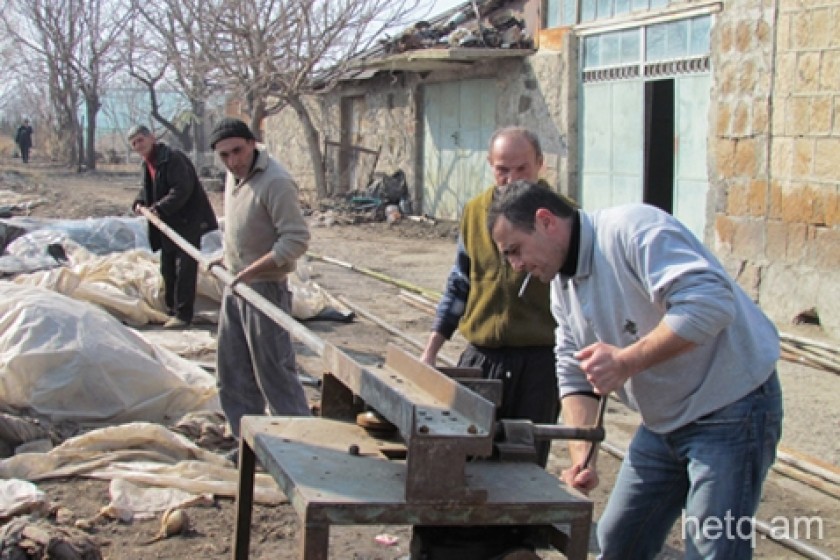
A Hard Knock Life: Armenian Villagers Rely on Bank Loans to Make a Living
The residents of Arevashat village in Armavir Province support each other in cultivating the land, but they say that without loans from the bank they are unable to invest in a greenhouse and grow crops to sell at the market.
The sun had not yet managed to heat the land, but the craftsmen of Arevashat village in Armavir Province were already ready to work on building a greenhouse on the land belonging to fellow villager Armen Mnatsakanyan.
The construction work was led by Haroutyun Petrosyan, otherwise known as Master Harout, who did the soldering work himself. "Come see what days the villager bears," he said.
Those present have devoted their day to building the greenhouse, and Master Harout assures us that no one is paid for their work — in the village, they always help each other.
"That's what fellow villagers are for, to come help each other for free. If it was for money, there are so many masters that they would go and get them. We'll build the greenhouse, have something to eat, congratulate [each other] and then go home. I've even stopped drinking — it's been two years that I've been sober. I saw the people standing next to me are small, they're getting out of hand, I leave it to them, let them drink a little," says Master Harout, smiling.
Though everyone was in high spirits because, by their account, "they've gathered for a good task," spring will soon come and villagers will be faced with hardships. Master Harout points to the high price of fertilizer, pesticides, and irrigation water, and the lack of agricultural equipment.
"Whoever has equipment today is a private property — they've put on such high price tags and they go with it. The cost of a small tractor operating a 1,000-meter land is 20,000 dram [a little less than $50 USD]. Is it easy to earn that money? We buy a canister of diesel fuel for 10,000 dram [$25]: by the time we get to the field with the tractor, it's already gone. Now we don't know: should we spend on transportation fare or go work on the land?" says Master Harout, and jokingly proposes his solution to the problem. "At least if there was polygamy, women would go work on the land; plus, there would be a lot of children."
While the men were outside preparing the greenhouse, Armen Mnatsakanyan's wife, Mariam Avetisyan, said that though a greenhouse is expensive, there's no other alternative. They've already decided that they will plant cucumbers and tomatoes.
"To build a 250-square-meter greenhouse with a drip system, you need about $1,000. It costs too much; we buy the plastic covering second- and third-hand and [still] it's more expensive. The government has to be in direct contact with villagers and that link shouldn't be mediated, so that we will be able to stand on our feet," she says, adding that the family has given their gold to a bank as collateral for a loan, and they are carrying out this work with that money.
According to Mariam, it's not possible to cultivate the land without obtaining a loan, and this is why gold is constantly given to banks as collateral, then taken back, and like this continuously.
"The land enjoys a lot of expense, you have to spend money so that you can have an income; in addition, land is something like a lottery — one year you can avail of it; the next year, completely suffer. Or it gets cold, [the crops are] frozen, or rain and hail destroy [the crops]," she said and points to the radishes buried in the earth outside the house, one part of which was frozen and had to be thrown out. Many Arevashat villagers' radishes were frozen.
"While people were sitting warmly in their homes we were outside washing radishes with cold water during the cold [spell] in December and January, so we could take them to market. It's true, I'm not complaining, we were able to have money on hand, but it's a lot of suffering," says Marine and rushes to prepare food for the working men.
 Videos
Videos Photos
Photos




Write a comment